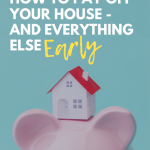Your debt load is so heavy it is consuming your life. Just when you feel there is no answer to your dilemma, you start eying the equity in your house. Pressured by the stress of your debt, you begin considering the unthinkable: selling your house to pay off debt.
Should you? The answer is “maybe”. Before making this decision, you need to back up and clearly understand why you are in the fix you are in. Start by asking yourself this question:
Why am I in debt?
You need to identify the source of your debt before you can properly attack it. Is the debt a result of poor money management or because your house is too big for your budget? Hint: if your mortgage payments are less than 30% of your take home pay, you have money management problems. On the other hand, if your mortgage payments are above 40%, you probably have too much house. Depending on how you answered, here are some tips:
Money management problems
Selling your house to pay off debt is treating the symptom instead of the illness. Reality is that you can afford to keep your house if you learn to manage your money. Whether you eventually sell your home or not, you need to:
1. Make a budget. You will never be able to manage your money without a budget. No exceptions. Write down all of your take home pay and all of your expenses. Agree with your spouse. Now track them and adjust them each month until you are confident that you are in control of your money.
2. Get rid of other debt. If car payments are dragging you down, get rid of your car. Give up eating out, vacations and satellite TV until the debt is gone. Consider taking on a second job. It won’t be easy, but the best way to deal with your mess is to clean it up.
Too much house
People with too much house often manage their money quite well and live very frugally just to make their monthly mortgage payments. Is this you? Does your house payment feel like an anchor trying to pull you under? Are you unable to make progress on your debt reduction because your house payment controls your life? If so, you probably need to sell your house. This being said, you should not blame your debt on your house payment; you still need to manage your money and make the same sacrifices (get rid of car, no eating out, no vacations, etc) in order to eat away at that debt while you are marketing your house.
Special considerations
While the above analysis should give you the guidelines for whether to sell your house, I realize the decision is not a black and white issue. Some special considerations are:
- I know I have money management problems, but I have so much debt that it will take me years to get rid of it. I would love to sell my house and take care of the debt immediately.
I applaud your enthusiasm. My concern, however, is that you may be taking a shortcut to learning money management. I suggest you try the tips under “money management problems” for six months and then re-evaluate your decision.
- We fall in money management problem camp, but we hate our house. Shouldn’t we go ahead and sell it?
Sure. But now the motive changes. You are selling because you hate the house, not because of your debt. I think you should sell, pay off debt, and rent while you are saving up down payment for another house. Of course continue working on the source of your problem: money management. Otherwise, whether you rent or buy again, that debt will reappear.
- We know we have too much house, but we love our house. Is there a way we can keep it?
I hate to see people sell their houses. It is an extreme move, especially if you love your house. But if you are living on a tight budget, you don’t see any big pay raises on the horizon, and you are unable to make progress on your debt – or save for an emergency fund or invest for retirement – your house is controlling your life. You would probably be better off with less house.
- I know I have too much house, but I am recently divorced and I want the kids to maintain the stability of living in the same house. Finances are extremely tight because we used to make the mortgage payments on two salaries and now I am making them on my own. Any thoughts?
I realize this is a delicate time for you and your children. However, staying in a house you can’t afford is not in your best interests or theirs. Children are much more resilient than we give them credit for. Moving to a smaller house with less stress will usually be best for both the kids and for you. If you explain to them what is going on, my hunch is that they will do fine.
Concluding thoughts
Selling your house to pay off debt, while admirable, can be a way of masking a money management problem. You need to clearly identify whether your debt is because of poor money management or too much house before you make your decision. Whereas the issue is not always black and white, the more clarity you have about the source of your debt, the better decision you will make.
Readers: Have you sold your house to pay off debt? How did it go? Any advice for other readers?
This post is adapted from a staff post I wrote for Christian PF.



Leave a Reply